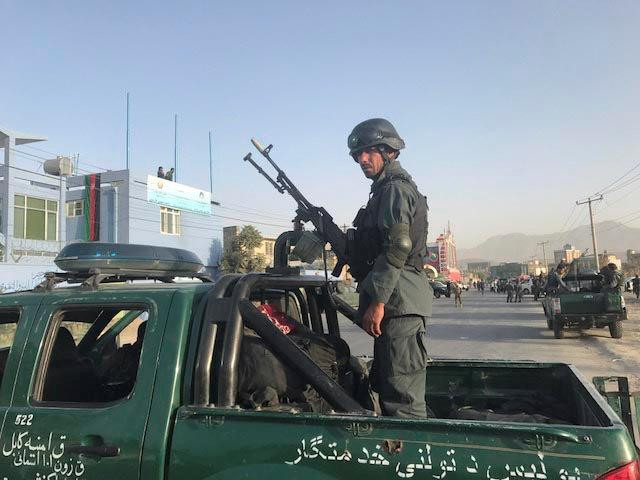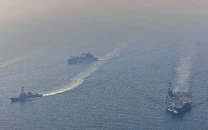Afghanistan mulls plan to arm 20,000 civilians to fight insurgents
'People will be recruited from their areas because they know their regions and how to keep them'

An Afghan policeman stands at the site of a blast in Kabul, Afghanistan September 13, 2017. PHOTO: REUTERS
The proposal for a government-backed armed group that would protect its own communities from the Taliban and the Islamic State group comes as Afghanistan's security forces, demoralised by killings and desertions, struggle to beat back a rampant insurgency. But the proposal has raised concerns that the local forces could become unruly and turn into another abusive militia terrorising the people it is supposed to defend.
Afghanistan apprehensions: Terrorism brings Pakistan, China, Russia closer
"The Afghan government's expansion of irregular forces could have enormously dangerous consequences for civilians," said Patricia Gossman, a senior researcher at Human Rights Watch. The New York-based group said Western diplomats in Kabul familiar with the plan -- modelled on the Indian Territorial Army that supports the country's regular forces - said Afghan officials had expressed concerns the militia could be used by "powerful strongmen" or become "dependent on local patronage networks".
American and Afghan officials told AFP the fighters would come under the command of the Afghan army and be better trained than the Afghan Local Police - a village-level force set up by the United States in 2010 and accused of human rights violations. "Right now we rely on commandos and air strikes to retake the lost territories but after the commandos leave we don't have enough forces to hold onto the territories," said a senior defence ministry official who asked not to be named.
"The force will operate under an army corps and will be used to fill the gaps. They will be recruited from the locals and will be numbered around 20,000." Defence ministry spokesperson Dawlat Waziri confirmed to AFP that a plan for "local forces" was being discussed.
"People will be recruited from their areas because they know their regions and how to keep them," Waziri said, but added there was no guarantee it would be implemented.
A spokesperson for NATO's Resolute Support train and assist mission also confirmed a proposal for an Afghan territorial army was on the table. But another American official, who spoke on the condition of anonymity, told AFP the idea was still in "the brainstorming phase". The Afghan government and its foreign backers have been cultivating militias to bolster the 330,000-strong Afghan National Security and Defense Forces as they battle to get the upper hand in the grinding conflict.
In Afghanistan, militias - private armies and government-backed armed groups - have a long and chequered history in the war-torn country and many Afghans are wary of them. Civilian casualties were at record highs in the first six months of 2017, a UN report showed, with forces loyal to the Afghan government accounting for nearly 20 percent of the deaths and injuries. Since NATO ended its combat mission in 2014 the Taliban has been gaining ground and Islamic State is expanding its footprint.
CIA pushes for authority to conduct drone strikes in Afghanistan
As of February only about 60 percent of Afghanistan's 407 districts were reported to be under government control, according to the US watchdog agency SIGAR. Earlier this year Afghan President Ashraf Ghani ordered a near doubling of the country's elite fighting force from 17,000 as part of a four-year roadmap that also aims to strengthen Afghanistan's air force. While US President Donald Trump's commitment to increase American troop numbers and leave them there indefinitely has been welcomed by Afghan authorities, they know it will take time to improve the fighting abilities of their security forces. With parliamentary and presidential elections planned in the next two years they want a security quick fix.
But critics fear that rather than support Afghanistan's beleaguered security forces, the militia could aggravate factionalism and push Afghanistan deeper into conflict. "It's a tool that the US military and successive Afghan governments have reached for and it looks like a solution to their problems but actually the real solution would be to have a functioning ANA (Afghan National Army) and ANP (Afghan National Police)," Kate Clark, a senior analyst at Afghanistan Analysts Network, told AFP. "It's a dangerous thing to play with, arming your civilians."



















COMMENTS
Comments are moderated and generally will be posted if they are on-topic and not abusive.
For more information, please see our Comments FAQ